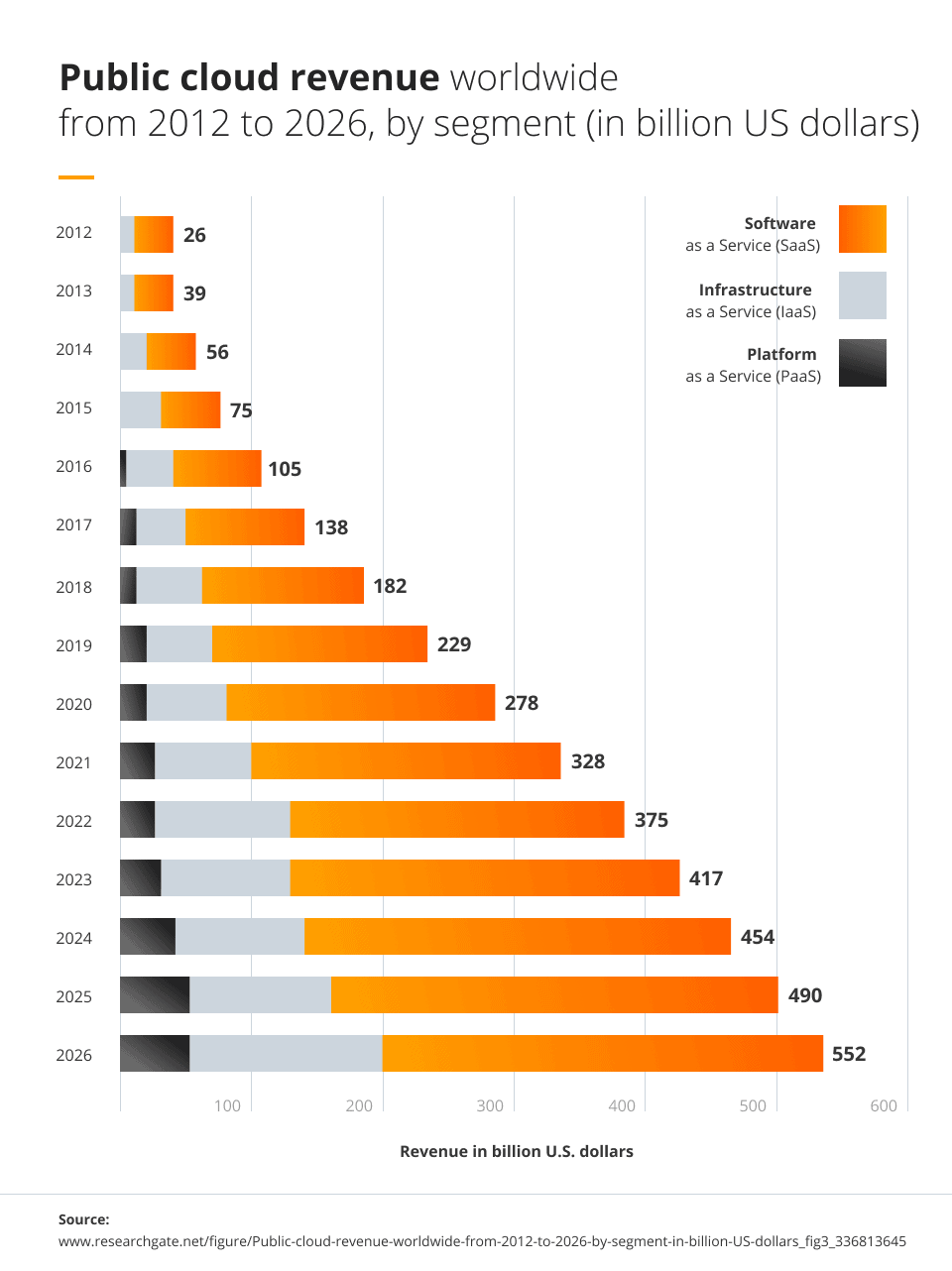
Why is Cloud Computing important and will get even more vital in the future?
The success of modern business growth lies, among others, in moving towards cloud computing technology. It enables fast, cost-effective, highly secure business operations and helps answer the challenges of the current crisis. Let’s see why the global cloud computing market is growing big.
Cloud services market spendings and revenue
All three cloud computing segments – software as a service (SaaS), platform as a service (PaaS), and infrastructure as a service (IaaS) – are projected to see revenue growth in the near future.


What is Cloud Computing?
Microsoft, as a provider of one of the best-known cloud computing platforms, Azure, keeps the cloud computing definition simple:
Cloud computing is the delivery of computing services – including servers, storage, databases, networking, software, analytics, and intelligence – over the Internet (“the cloud”) to offer faster innovation, flexible resources, and economies of scale.
Why is cloud computing important? The most innovative aspects of cloud computing are the pay-as-you-go pricing model and the enormous economy of scale, as well as the agility, elasticity and high availability that cloud solutions offer.
It is no surprise that more and more companies are moving different areas of their business to the cloud and searching for cloud consulting.
Cloud operations, commonly called CloudOps, help lower operating costs, run infrastructure more efficiently, and flexibly scale when a business needs to change. These are just a few cloud computing technology basics to start with.
Read more about Cloud based services for companies:
- Cloud Operations (CloudOps) Solutions For Businesses
- How Cloud enables Digital Transformation and accelerates it?
- Company cloud migration examples: companies that migrated to the cloud
What are the types of Cloud Computing services?
Customers’ needs may differ, thus cloud providers offer various models, types, and services to match solutions with the requirements. A type of cloud deployment model and architecture to implement solutions must be determined initially.
There are 4 main types of cloud services to choose from: public, private, hybrid, and multi-cloud.
Public cloud – includes freely available cloud systems, such as Google Cloud, Amazon Web Services and Microsoft Azure.
Private cloud – a cloud solution based on local resources, dedicated specifically to a person or company.
Hybrid cloud – a mix of on-premises infrastructure with cloud storage and computing services.
Multi-cloud solution – a combination of multiple cloud providers; a solution that allows companies to cherry-pick the best features of many different cloud systems to optimise their needs.
Read more about them in our article: “Public Cloud vs Private Cloud vs Hybrid Cloud: What are the differences?“
The impact of Cloud Computing on the IT departments
Cloud computing has significantly cut IT costs, with committed organisations seeing a significant spending drop. The shift has minimised the need for physical servers, resulting in savings in space and maintenance costs, which means that IT teams can redirect their efforts from infrastructure management to addressing critical business issues.
Moreover, the agility of cloud technology has sped up tasks like server setup, boosting productivity and innovation.
One of the biggest advantages of cloud adoption is that it has simplified operations and made applications more accessible, improving efficiency. Access from different devices promotes smoother workflows and collaboration, reducing data centre expenses and cutting IT personnel costs.
Cloud Computing: the most sought after IT skills
While skills like IT security and software development solutions were in demand in the past, cloud computing has become the hottest skill in the IT job market. CIOs and IT Directors have identified Cloud knowledge as the most valuable asset for career progression and advancement. Most of them express intentions to hire additional personnel to support their cloud initiatives.
Despite widespread cloud computing services, many organisations struggle with their cloud strategies due to a lack of skilled personnel. In 2023 the top skills gaps identified by leaders include cloud security management, cloud architecture, data analytics, engineering and storage.
To keep up with talent needs, employers, schools, and training providers need to work together to make cloud training accessible. If we don’t, we risk falling behind and losing out on the benefits of cloud computing.
Guide for successful cloud adoption
Download our comprehensive ebook for cloud adoption
Reasons why Cloud Technology is important for business growth
Cloud computing shows increasing competitiveness through cost savings, flexibility, elasticity, and optimal resource use. As a technology, cloud computing is a complex solution for businesses that want to benefit from digital transformation.
Cloud computing enables cloud-native technologies, supports more efficient work, and unlock capabilities of machine learning (ML) and artificial intelligence (AI).
Here’s how organisations use cloud computing to increase business value:
Lowered complexity of IT infrastructure management
With cloud-based infrastructure solutions, managing IT facilities can be made easier. Engineers and other IT professionals take control of their cloud environments by using management tools designed specifically for the cloud architecture they’re working with.
At the same time, smaller teams can take on larger workloads and provide services seamlessly by relying on cloud service providers for management and upgrades.
Increased collaboration and innovation
Cloud environment helps develop new offers, evaluate a company’s place on the market and fulfil new needs quicker than the competition. It is way easier to experiment with new ideas with faster user feedback and automated processes that enable the development of new digital services.
Employees want to develop their skills on new, available technologies, and modern candidates search for employers that offer authentic growth.
Cloud solutions help automate repetitive processes, leaving space for more innovation and development.
Easier development and testing
The cloud creates a great environment for software development as DevOps teams can invent, test, secure and produce solutions for specific needs. It is way faster, easier and more flexible compared to in-house testing and development.
Cloud Computing speeds up processes with cloud-based development tools, apps and software.
Big Data analytics
Thanks to the numerous opportunities cloud computing technology brings, businesses get invaluable information that helps optimise different processes.
Big Data analytics helps transform large volumes of data into useful insights and bring out true business value.
Pros:
Easier extraction of useful information e.g. consumers’ segmentation or behavioural patterns.
Detailed insights thanks to using Machine Learning (ML) and Artificial Intelligence (AI) in cloud computing services.
Better business decisions based on data.
Cloud Storage services
Files being saved automatically to the cloud is what cloud data storage is about. All documents can be accessed, stored, opened or downloaded from any device with an Internet connection.
As far as sensitive data is concerned, companies can store it on-premises as part of a hybrid or private solution. Companies pay only for the amount of cloud storage they actually use.
Boosted speed & agility
Cloud computing technology helps respond faster and more accurately to changing business conditions. Different resources are available in a few minutes or even seconds, which enables companies to respond with a higher speed to customers’ needs and catch up with the market.
Increased focus on core business
When businesses use cloud infrastructure, they can better concentrate on what matters most to their success: their core competencies, customers, and employees.
This laser-like focus on fundamentals is what helps businesses expand, create new products and gain an edge in their marketplaces.
How Cloud Computing could help your organisation? Let’s find out!
As the rapid development of cloud computing services shows, the future indeed is in the cloud. High expectations towards companies will grow on many different levels, and unexpected changes may occur, so there is no time to waste.
Cloud technology drives innovation and business agility, allows scaling and faster adaptation to dynamic changes, improves business operations, and decreases costs. If you want to prepare for the implementation of cloud solutions and choose the best partner to do it, use our free RFP template for Cloud Services.
Those who already took the step towards the cloud, save resources and grow bigger faster. It becomes essential to step into the future that is already here.





